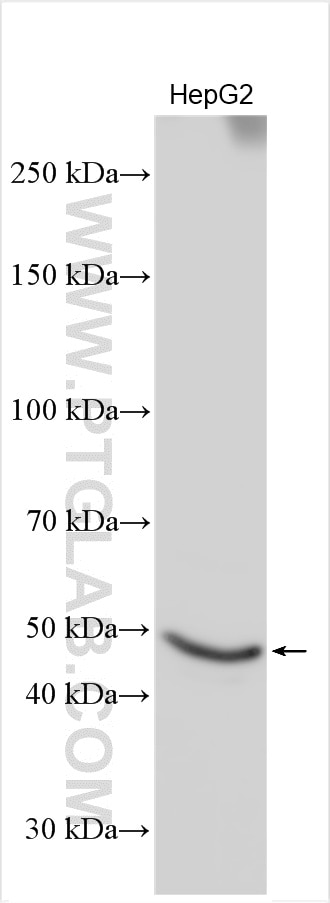Tested Applications
| Positive WB detected in | HepG2 cells |
Recommended dilution
| Application | Dilution |
|---|---|
| Western Blot (WB) | WB : 1:1000-1:6000 |
| It is recommended that this reagent should be titrated in each testing system to obtain optimal results. | |
| Sample-dependent, Check data in validation data gallery. | |
Product Information
20613-1-AP targets PORCN in WB, ELISA applications and shows reactivity with human samples.
| Tested Reactivity | human |
| Host / Isotype | Rabbit / IgG |
| Class | Polyclonal |
| Type | Antibody |
| Immunogen | PORCN fusion protein Ag14664 Predict reactive species |
| Full Name | porcupine homolog (Drosophila) |
| Calculated Molecular Weight | 461 aa, 52 kDa |
| Observed Molecular Weight | 43~50 kDa |
| GenBank Accession Number | BC019080 |
| Gene Symbol | PORCN |
| Gene ID (NCBI) | 64840 |
| Conjugate | Unconjugated |
| Form | Liquid |
| Purification Method | Antigen affinity purification |
| UNIPROT ID | Q9H237 |
| Storage Buffer | PBS with 0.02% sodium azide and 50% glycerol , pH 7.3 |
| Storage Conditions | Store at -20°C. Stable for one year after shipment. Aliquoting is unnecessary for -20oC storage. 20ul sizes contain 0.1% BSA. |
Background Information
PORCN is one of several related membrane-bound O-acyltransferase (MBOAT) enzymes encoding a 461 amino acid-sized (52 kDa) protein named porcupine located in the endoplasmic reticulum and known to be involved in the processing, secretion, and signaling of Wnt proteins (PMID: 17546031). Overexpression of PORCN could promote the proliferation and migration abilities of HCC cells both in vitro and in vivo (PMID: 37588740, 23188502).
Protocols
| Product Specific Protocols | |
|---|---|
| WB protocol for PORCN antibody 20613-1-AP | Download protocol |
| Standard Protocols | |
|---|---|
| Click here to view our Standard Protocols |



